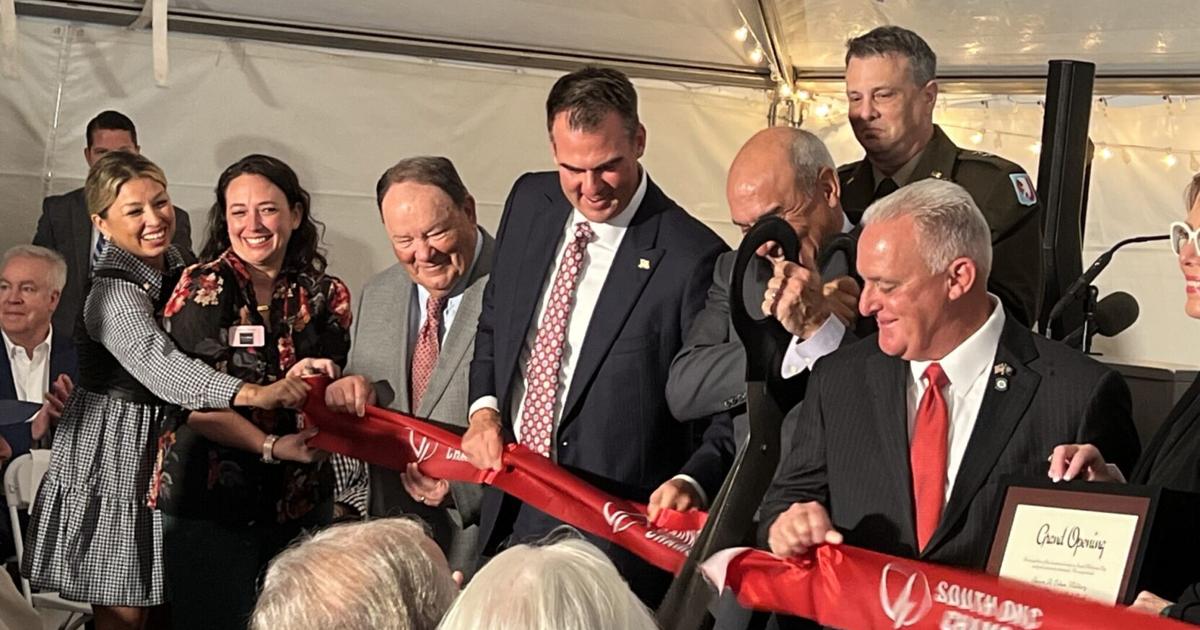
#inform-video-player-1 .inform-embed { margin-top: 10px; margin-bottom: 20px; }
#inform-video-player-2 .inform-embed { margin-top: 10px; margin-bottom: 20px; }
OKLAHOMA CITY — For U.S. Army combat veteran Ryan Pitts asking for mental health treatment was the hardest thing he ever had to do.
“My biggest regret is that I didn’t get help sooner,” he said.
Pitts told his story to a crowd gathered under a rain-soaked tent outside the new Steven A. Cohen Military Family Clinic that opened in south Oklahoma City on Tuesday morning.
Several years after Pitts lost nine service members while on a mission in Afghanistan, he struggled with survivor guilt and the belief their deaths were his fault.
Pitts shares his mental health struggles in the hope he inspires others to get help before it’s too late.
Cohen, a non-profit organization, has 24 clinics throughout the nation with a goal to provide low- cost or free mental health care to veterans who have served since Sept. 11, 2001. Their care is also unique in that it provides mental health support for veterans’ families as well. Following a soft opening about a month ago, the clinic has served 100 people in Oklahoma City.
This marks the nonprofit’s second clinic in the state. The first, located in Lawton, has treated over 1,000 veterans since it opened in 2020, spokesperson Anthony Guido said.
The new clinic will employ eight people.
Guido said the decision to open in Oklahoma was based on high demand and the veteran population. Oklahoma has the 13th highest rate of veterans per capita. The state is home to more than 67,000 veterans and 33,000 military service members who have served since Sept. 11.
“For us, it’s all about where the need is,” he said. “Between Oklahoma and Texas, we have six clinics, so it’s a big corridor.”
The clinic is a partnership between Red Rock Behavioral Health and Cohen. Gov. Kevin Stitt said the state contributed $1.3 million to pay for half of both clinics’ operating costs. Cohen paid the upfront costs and for the building.
“It’s a public private partnership so we’re not having to spend the $2 million to invest in the building, they’re doing all that privately,” Stitt said. “That’s a great model. We’re not having to grow government.”
Lindy White, a member of the Oklahoma Army National Guard, oversees behavioral health contracts. She said the Guard has been working closely with the Lawton location.
“I’m excited that they’re opening up a branch here in Oklahoma City because we have a need here,” White said. “Cohen provides another opportunity for us to say, ‘Hey, here’s another resource.’”
Military suicide rates have increased since 2015 and in 2020 reached a record high. The Pentagon began tracking suicide rates in 2008.
From 2015 to 2019, an average of 137 Oklahoma veterans committed suicide. Their suicide rate was two times higher compared to non-veterans, according to the National Violent Death Reporting System.
Carrie Slatton-Hodges, Oklahoma Department of Mental Health and Substance Abuse Services commissioner, said Cohen clinics bring something unique to Oklahoma because few treatment programs are accessible to military spouses and children in Oklahoma.
“It’s not something your average clinician or your average clinic knows and understands and can embody the work that is needed,” Hodges said. “The folks that work at these clinics understand that culture.”
The event drew military service members who offer mental health support. Mental health flight commander and nurse Joe Leondike, who is stationed at Tinker Air Force Base, said more veterans are asking for help.
“I think a lot of people are really open to getting mental health services. I think we’ve reduced the stigma,” he said. “The problem is we haven’t been able to expand the services.”
Adding the new clinic will help, Leondike said.
#inform-video-player-3 .inform-embed { margin-top: 10px; margin-bottom: 20px; }
